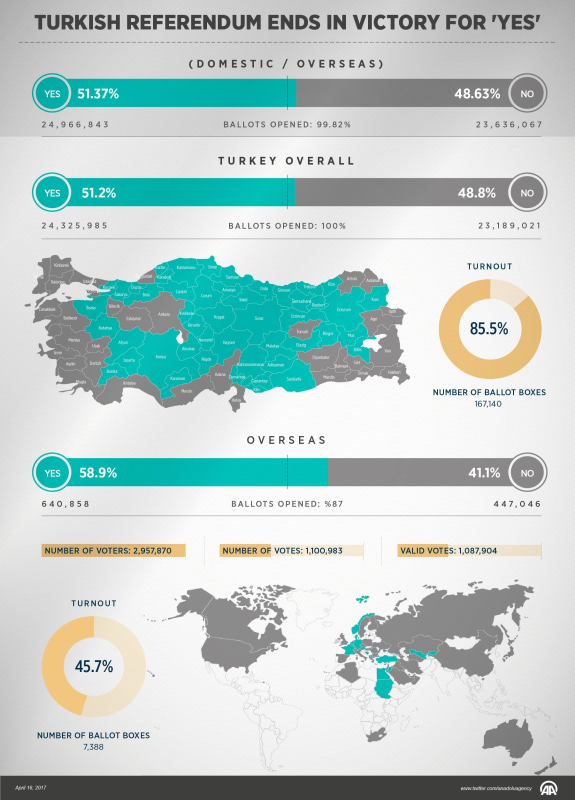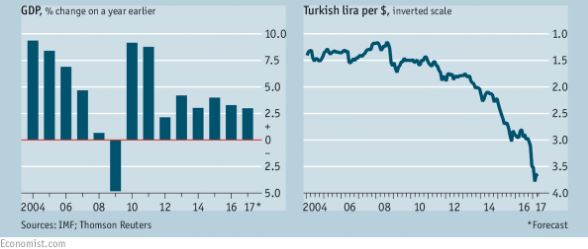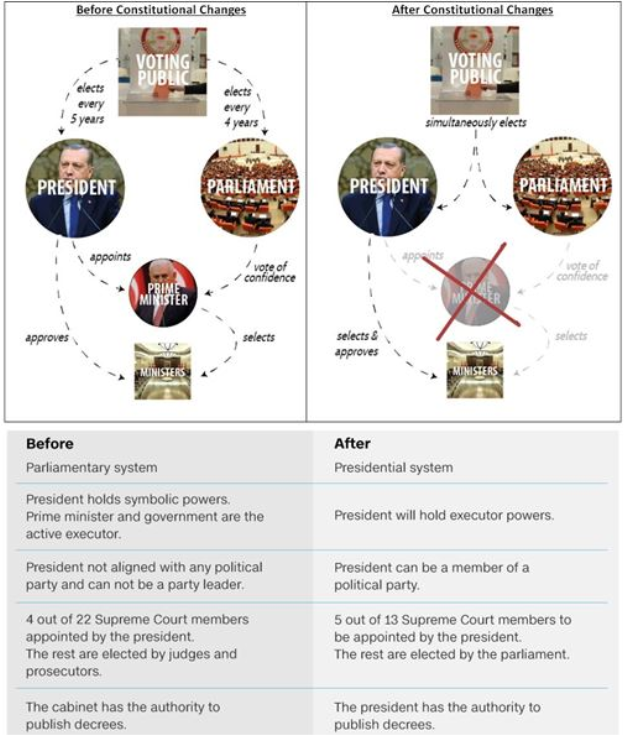Turkey: Erdogan’s Referendum Victory Delivers “Presidential System”
Based on unofficial results released by Turkish officials, constitutional changes to establish a "presidential system" in Turkey appear to have been adopted via a 51.4% favorable vote in an April 16, 2017, nationwide referendum. President Recep Tayyip Erdogan and the ruling Justice and Development Party (AKP) had campaigned vigorously in support of the changes after obtaining the requisite parliamentary approval with the support of the Nationalist Action Party (MHP) in January 2017. Assuming the outcome holds despite some allegations of irregularities, most of the changes—including the abolition of the office of prime minister—would take effect after Turkey's next presidential and parliamentary elections, which would be scheduled for November 2019.
|
Figure 1. Unofficial Referendum Results |
 |
|
Source: Anadolu Agency. |
Legitimacy, Implementation, and Future Elections
Particularly given the relatively slim margin of victory in the referendum, various observers have expressed skepticism regarding the vote's legitimacy. Various factors under the government-declared state of emergency (initially instituted after a July 2016 failed coup attempt by elements from within the military) may have favored the "yes" campaign, including the displacement of thousands of Kurdish residents in southeastern Turkey (a bastion of opposition to the constitutional changes) and the imprisonment of key leaders of the country's pro-Kurdish opposition party (Peoples' Democratic Party, or HDP). On April 18, Turkey's parliament extended the state of emergency through July 19, 2017.
The main opposition Republican People's Party (CHP) appealed a decision made by Turkey's electoral board during the voting to count unstamped ballots, and there is some anecdotal evidence of other possible irregularities. Some citizens in major cities have also protested the referendum's conduct and outcome. After the electoral board rejected the opposition parties' appeal on April 19, CHP leadership said it would separately appeal to Turkey's Constitutional Court, and, if necessary, the European Court of Human Rights. Election observers from the Organization for Security and Co-operation in Europe (OSCE) and the Parliamentary Assembly for the Council of Europe have provided a preliminary report criticizing the electoral board decision and addressing other concerns. The OSCE expects to publish a final report by June.
Opponents of a presidential system generally inveigh against Erdogan's illiberal turn and repressive measures. Some proponents, meanwhile, assert that most Turks' economic well-being has improved since Erdogan became prime minister in 2003, or that Turkey is better off with a strong government focused on one clear leader than returning to past troubles with weak parliamentary coalitions or unelected elites from the military and bureaucracy holding greater power.
|
Figure 2. Economic Growth and Currency Strength in Turkey: 2004-2017 |
 |
When, how, and by whom the constitutional amendments will be implemented remains unclear. As mentioned above, most of them only come into effect after the next presidential and parliamentary elections, which are scheduled for 2019 but could take place earlier if parliament calls for them. Under the changes, after the next presidential election, Erdogan (or any other person elected president) would be able to serve for two five-year terms, and possibly three if parliament calls for early elections before the end of the second term.
|
Figure 3. Overview of Government Formation and Powers in Turkey |
 |
|
Source: CNN and jamesinturkey.com, adapted by CRS. |
Erdogan has dominated Turkish electoral politics since 2002 and it is uncertain whether viable opposition could materialize in the next two years. However, his dominance could change if key constituencies' attitudes shift as a result of the referendum or other factors. For example, Turkey's economic well-being depends on foreign exchange and investment, and the flow of capital could decrease if international investors have less confidence in the Turkish market under increased state controls.
Regarding the amendments' impact, a U.S. analyst who undertook a comprehensive analysis in March 2017 stated that, on paper, some checks and balances would remain on the president's executive power. However, he also wrote that if Erdogan wins the presidency and the AKP wins a parliamentary majority, "one-man rule is very likely," and would complete a profound transformation of putting two major Turkish state institutions—the judiciary and the military—"firmly under the president's thumb." The more time Erdogan spends in office, the more he may be able to use his powers of appointment and patronage to cement his or his family's control over state institutions—possibly "immunizing" himself from future prosecution.
Implications for U.S., NATO, and EU Relationships
Debate continues within and outside Turkey about how the referendum and its aftermath will affect political and economic stability, freedom of expression, and political participation within Turkey, and how domestic developments might impact Turkey's international relationships. Turkey is an important U.S. ally and NATO member, and hosts most of the U.S. or U.S.-allied aircraft that strike Islamic State positions inside Syria. Given its geographic position and Muslim majority, Turkey has traditionally also been seen as a bellwether country for the prospects of democracy and free markets on the margins of the Western world. U.S. influence over Turkey's internal affairs may be somewhat limited in light of various factors, including Turkey's largely independent political and economic position, and current U.S.-Turkey tensions on matters involving Kurds in Syria and the U.S.-based former Turkish cleric Fethullah Gulen.
Turkish political and economic developments following the referendum may have direct or indirect implications for the following issues:
- U.S.-Turkey partnership vis-à-vis political and military outcomes in Syria and Iraq and other important regional actors such as Russia, Iran, and Israel.
- Turkey's commitment to the NATO alliance, to hosting U.S. and NATO assets, and to a closer relationship with the European Union (EU).
- U.S. and Turkish decisions on possible arms sales to Turkey, including Turkey's reported consideration of a Russian air defense system.
- The extent to which Turkey engages Kurdish nationalists in Turkey and Syria politically or confronts them militarily.
- Turkey's role in monitoring and controlling the transit of migrants, refugees, and foreign fighters.
For background information, see CRS Report R44000, Turkey: Background and U.S. Relations In Brief, by [author name scrubbed] and [author name scrubbed].
Western reactions to the referendum have varied. On April 17, the State Department encouraged those on both sides of the vote to work "together for Turkey's future" and for the Turkish government to "protect the fundamental rights and freedoms of all its citizens," while noting concerns over whether the vote was free and fair. Later that same day, President Donald Trump congratulated Erdogan during a phone call that also addressed U.S.-Turkey regional cooperation. The following day, a White House spokesperson explained that the President was not prejudging the referendum's outcome, but that cooperating with Turkey on security issues and "developing the relationship" would be important in any event. Erdogan is scheduled to make his first White House visit since 2013 in May 2017. With many European leaders concerned about potential long-term implications for democracy and rule of law in Turkey, the European Commission issued an April 16 statement encouraging consensus and indicating it would attentively follow the practical implementation of Turkey's constitutional amendments. Erdogan's efforts in the past decade to consolidate power, his inflammatory rhetoric toward some European countries during the referendum campaign, and his post-referendum reference to possibly reintroducing the death penalty have increased tensions between Turkey and the EU—its main trading partner—and appear to have further decreased the already remote chances for Turkish EU accession.